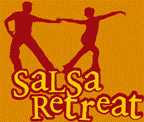Salsa Retreat received a people-to-people license from the U.S. Treasury Department to conduct legal dance & music workshops in Cuba; first excursion to Havana is scheduled for January 2014.
 Seattle, WA - Salsa Retreat, a Seattle-based company, is now offering legal music and dance workshops in Havana, Cuba. The one week excursion to Havana is consistent with the requirements for legal travel and provides a full-time schedule of educational and cultural activities. This trip is designed for music and dance enthusiasts as well as urban explorers who want to experience the rich cultural heritage that Cuba has to offer by learning from professional dancers and musicians in a classroom setting. The workshop will include lecture, discussion and hands-on practice. In addition to the classroom schedule the small group will explore how the culture of music and dance is exhibited by day and night throughout Havana. The workshop also includes field trips to the Callejón de Hamel where Rumba music is played every Sunday afternoon and to villages in the vicinity where the Santeria religion that influenced the music and dance traditions is still practiced today. To round out the experience a visit to Hemmingway’s house, the Playas del Este and a city tour of all the major sights is also included.
Seattle, WA - Salsa Retreat, a Seattle-based company, is now offering legal music and dance workshops in Havana, Cuba. The one week excursion to Havana is consistent with the requirements for legal travel and provides a full-time schedule of educational and cultural activities. This trip is designed for music and dance enthusiasts as well as urban explorers who want to experience the rich cultural heritage that Cuba has to offer by learning from professional dancers and musicians in a classroom setting. The workshop will include lecture, discussion and hands-on practice. In addition to the classroom schedule the small group will explore how the culture of music and dance is exhibited by day and night throughout Havana. The workshop also includes field trips to the Callejón de Hamel where Rumba music is played every Sunday afternoon and to villages in the vicinity where the Santeria religion that influenced the music and dance traditions is still practiced today. To round out the experience a visit to Hemmingway’s house, the Playas del Este and a city tour of all the major sights is also included.
About Cuban Music
Beginning in 1880 after the slaves were freed in Cuba and additional slaves who had escaped from hellish places such as Haiti had arrived, the first free gatherings of Africans from various regions in West-Africa took place. In the absence of a common language, these celebrations of the new found freedom focused on the drumming traditions that all West-African cultures had brought along with them, interwoven with their respective religious aspects. These gatherings were soon joined by European musicians who contributed their instruments, such as guitars, and their strongest musical tradition, the melody. These improvisations resulted in the birth of the musical genre called Rumba, the first Afro-Cuban music which is considered one main ingredient to the modern musical genre called Salsa. The Callejón de Hamel is one place in Havana where this can still be experienced today.About Legal Travel to Cuba
Most travel by U.S. citizens to Cuba is outlawed, but tens of thousands of Americans now visit the island legally each year on people-to-people tours, which are licensed by the U.S. Treasury Department. People-to-people trips must have educational and cultural exchange itineraries in order to be approved by the U.S. government. The U.S. Treasury Department requires a "full-time schedule of educational activities that will result in meaningful interaction between the travelers and individuals in Cuba."
The people-to-people cultural exchange licenses were reinstituted by the Obama administration in 2011, after being halted by the Bush administration. But requirements were tightened last year after criticism that many of the trips were masking recreational tourism to the Communist island.
